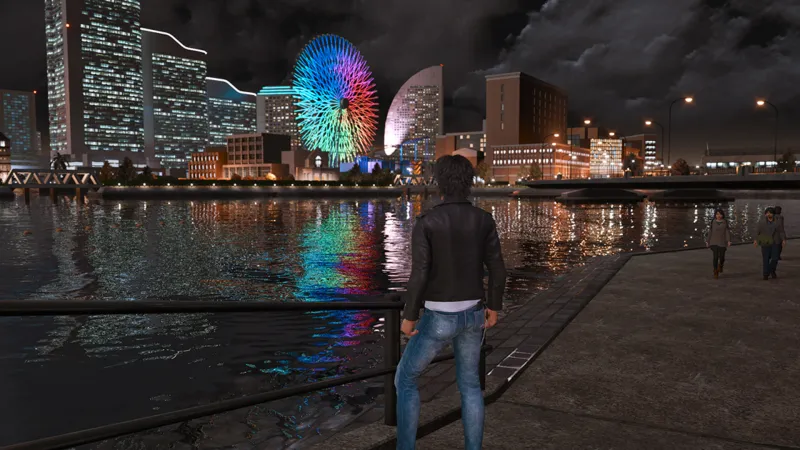
Lost Judgment, the newest game from Yakuza developer Ryu Ga Gotoku Studio and the second in its Judgment spin-off franchise, is out next week, so read our review and watch our episode of New Gameplay Today. To keep the Judgment train rolling, ahead of the game's release, we're running down everything we know about the game, from its story, themes, gameplay, and setting.

It's A Direct Sequel to Judgment
Even though it isn't RGG Studio's first spin-off set in the Yakuza world, Judgment made a comparatively huge splash when it was released in 2018. Telling the story of Takayuki Yagami, a disgraced lawyer-turned private eye, the game is set in Kamurocho, the main open-world location from the Yakuza series, but tells its own story aside from that of protagonist Kazuma Kiryu. After the events of Judgment, which had Yagami facing an assortment of corruptions within Japan – including false convictions, pharmaceutical conspiracies, and murder – Yagami has returned to his life investigating petty cases around Tokyo's redlight district. But of course, it's not long before he's pulled into a much larger case.

It All Starts With A Dead Body
(Content warning for sexual assault)
We recently had a chance to play through numerous different levels of Lost Judgment – including its opening. If you want to read the full article, which includes an interview with producer Kazuki Hosokawa, you can find that in the most recent issue of Game Informer. In the meantime, here's what we had to say about the game's opening moments:
Lost Judgment opens in Ijincho, Yokohama, the location from Like a Dragon and the latest open world in the overall series. Firefighters are racing to a scene; smoke billows out of an abandoned building, but there are no visible signs of fire, as one firefighter points out. It strikes him as a false alarm or a prank.
His assumption is not correct.
Once inside, they survey the floor with the smoke, discovering 14 flares arranged in the shape of an arrow pointing in the direction of a large mass covered by a tarp. Flies, hundreds of them, hover around. You can't be sure until one of the firemen musters the courage to remove the tarp, but you have a pretty good idea what lies beneath. It's bad.
Removing the tarp confirms your worst assumptions – a dead body. But not a fresh corpse. The skin is black with decay. The hands restrained behind the back, mangled and broken. The body has been here a while, maggots and larva making themselves at home in the decomposing hole that was once a nose. The camera slowly pans towards the corpse, and right before you can't take it any longer, the screen cuts to black, and in pipes a familiar voice.
"In Japan, 99.9 percent of criminal trials end with a guilty verdict," protagonist Takayuki Yagami says, a declaration of Lost Judgment's themes.
"The reality is, the law is neither as perfect or as fair as it's supposed to be," he says a few moments later. "So I've made it my job to give those without a voice a chance to be heard."
Set in December 2021, Akihiro Ehara is accused of groping a woman on a train. A bystander captures Ehara's attempt to flee on video. It's broadcast by the news, leading to a public outcry for a maximum sentence. However, Ehara brings up the corpse in Yokohama on trial, asking if the court has identified the person. His defense lawyer, Saori Shirosaki, a main character from the first game and one of Yagami's coworkers, asks Yagami to investigate, believing police overlooked important case details. Did Ehara commit two crimes at the same time? If so, how? Was his sexual battery case a cover-up? Or has he gamed Japan's justice system entirely? These are the central questions in Lost Judgment.

It's Dealing With Heavy Themes Affecting Both Japan And The World
If it wasn't clear in the previous section, Lost Judgment's story centers on some weighty topics, including Japan's actual 99-percent conviction rate, sexual assault, murder, and corruption within Japan's judicial system. Whether or not the game pulls any of this off with grace, we'll have to wait and see. But it is worth noting the game isn't pulling punches when it comes to its sociopolitical themes. And that's the point.
RGG's games, especially the most recent releases, have never shied from tackling political and social issues within Japan. And where many western studios tend to avoid these topics – or at least talking about them – Hosokawa is open about what RGG is trying to say in Lost Judgment and the purpose of video games as political platforms, telling us, "Whether or not video games are a good medium for dealing with political issues is not a function of the game itself, but rather a function of the relationship between creators and players."
As he sees it, when video games became a dominating force in entertainment, or as they "became as important as novels and movies as a means for meaningful experiences," it was only natural they would adopt narratives true to the real world. The implication seems that Hosokawa views his audience as a mature one who wants to play games that explore themes about society, not shirk away from the thought of video game creators being politically-minded people.
